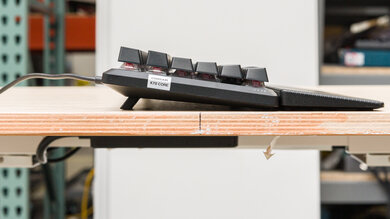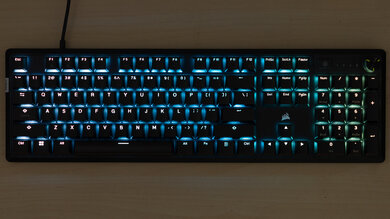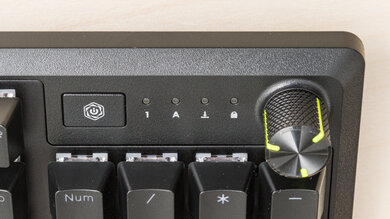The Corsair K70 CORE is a wired mechanical gaming keyboard that continues Corsair's longstanding K70 lineup. It's a full-size model that's available in three color options, and it uses Corsair's MLX Red linear mechanical switches. It also features a programmable control knob that Corsair calls a 'control dial.' You can program this knob and make changes to a host of other settings, including RGB lighting, custom profiles, and macros using Corsair's iCUE software.
This keyboard may come with or have a palm rest available for purchase separately, depending on the color option you choose. See the Differences Between Sizes and Variants section below for more details about available configurations.
Our Verdict
The Corsair K70 Core is an excellent gaming keyboard well-suited for playing games in any genre and at any competitive level. It has good overall build quality and provides outstanding latency performance. Its Corsair MLX Red linear switches are also lightweight and have short pre-travel distance, providing a responsive-feeling experience for playing fast-paced, reaction-based games.
-
Outstanding latency performance.
-
Good overall build quality.
-
Plastic material that makes up most of the keyboard, including the ABS keycaps, is somewhat cheap feeling.
The Corsair K70 Core is an acceptable keyboard for office use. It has good overall build quality, and the Corsair MLX Red linear switches are reasonably quiet to type on. That said, the typing is still louder than most dedicated office keyboards. Additionally, the switches are designed primarily for gaming as they're quite lightweight and may feel too sensitive for most people. This is also a wired-only keyboard that doesn't support Bluetooth or multi-device pairing, and while you can set macros using the software, you can't record them directly on the keyboard itself.
-
Good overall build quality.
-
Wired-only connectivity; no support for Bluetooth or multi-device pairing.
-
Lacks dedicated macro keys, and you can only program macros in software.
-
Plastic material that makes up most of the keyboard, including the ABS keycaps, is somewhat cheap feeling.
The Corsair K70 Core is a wired-only keyboard that isn't suitable for use with tablets or mobile devices.
The Corsair K70 Core is satisfactory for programming. The Corsair MLX Red linear switches offer a decent typing experience, but they're somewhat scratchy-feeling and are designed primarily with gaming in mind, so they're quite lightweight and may feel a bit too sensitive for coding work as they can contribute to more typos. It has good overall build quality, and the stock keycaps are shine-through, so you can read the legends in darker rooms. You can also program fairly complex macros using the software, although you can't program them directly on the keyboard.
-
Good overall build quality.
-
Lacks dedicated macro keys, and you can only program macros in software.
-
Plastic material that makes up most of the keyboard, including the ABS keycaps, is somewhat cheap feeling.
The Corsair K70 Core is bad for use in an entertainment or home theater PC setup, but it isn't designed specifically for this purpose. While it has good build quality, it's a wired-only model, so you must be close enough to your display to use it. Also, it's a full-size model designed for a desktop setup, so it can be awkward to use from a couch. Lastly, it lacks dedicated media keys, though it does have default media hotkeys bound and a control knob that controls media volume by default.
-
Good overall build quality.
-
Wired-only connectivity; no support for Bluetooth or multi-device pairing.
-
Plastic material that makes up most of the keyboard, including the ABS keycaps, is somewhat cheap feeling.
-
No dedicated media keys.
The Corsair K70 Core offers excellent raw performance with outstanding single-key and multi-key latency. It also supports full n-key rollover and has an effective update rate of 1000Hz that isn't bottlenecked by other latency components. Its performance makes it well-suited for playing games in all genres casually or competitively.
-
Outstanding latency performance.
- 8.6 Gaming
- 6.4 Office
- 1.0 Mobile/Tablet
- 7.0 Programming
- 3.1 Entertainment / HTPC
- 8.9 Raw Performance
Changelog
-
Updated Dec 02, 2024:
We've added mention of the GLORIOUS GMMK 3 in the Typing Quality section.
- Updated Feb 14, 2024: Review published.
- Updated Feb 09, 2024: Early access published.
- Updated Feb 06, 2024: Our testers have started testing this product.
- Updated Jan 29, 2024: The product has arrived in our lab, and our testers will start evaluating it soon.
Check Price
Differences Between Sizes And Variants
The Corsair K70 Core is available in three color options: Black, Steel Gray, and White. We bought and tested the Black colorway with an included palm rest, and you can see the label of our unit here.
| Name | Color Option | Included Palm Rest | Keycap Material |
|---|---|---|---|
| Corsair K70 Core | Black | Yes / No | ABS |
| Corsair K70 Core | Steel Gray | No | ABS |
There's an additional variant of this keyboard called the Corsair K70 SE. We expect our review to apply very closely to this variant as well, but we expect some minor build quality differences as Corsair indicates the bottom case of the Corsair K70 Core SE is made with 85% post-consumer plastic. It also has stock dye-sublimated PBT plastic keycaps, which we expect to be somewhat higher quality with more durable legends than the stock doubleshot ABS keycaps on the standard Corsair K70 Core. If you have this keyboard variant and notice other differences, please let us know in the comments.
| Name | Color Option | Palm Rest | Keycap Material |
|---|---|---|---|
| Corsair K70 Core SE | White | Yes | PBT |
Compared To Other Keyboards
The Corsair K70 Core RGB mechanical gaming keyboard continues Corsair's longstanding K70 lineup, which Corsair designates as their mid-range lineup compared to their more entry-level K55 and more premium K100 lineups. Corsair positions the K70 Core as a baseline, budget-oriented model that introduces some minor improvements to the lineup, including switches that are now factory-lubed and sound-dampening materials that help cut down on the rattle and ping of typing somewhat.
That said, the K70 Core lacks features found on other models in the wider K70 lineup, like wireless connectivity offered by the K70 PRO MINI WIRELESS or magnetic analog switches as offered on the Corsair K70 MAX. Ultimately, despite its minimal feature set, the gaming performance of the K70 Core is roughly on par with these more expensive options, making this keyboard a standout option at a budget price point if you're looking for a more straightforward, full-size model for gaming in any genre and at any competitive level.
For more recommendations, see our picks for the best Corsair keyboards, the best gaming keyboards, and the best budget mechanical keyboards.
The Corsair K70 RGB PRO and the Corsair K70 CORE are both full-size mechanical gaming keyboards in Corsair's K70 lineup. Note that these two keyboards are on different test benches, so some of our tests (including latency and typing noise tests) aren't directly comparable. The Corsair K70 RGB PRO is notable for better overall build quality, including higher-quality PBT keycaps. It also has a higher maximum polling rate of 8000Hz, providing more stable and consistent latency performance. On the other hand, the K70 CORE is a newer model with switches that are pre-lubed from the factory, making them feel somewhat smoother. It also has sound-dampening material inside the case and spacebar, making it a bit quieter to type on.
The Corsair K70 RGB MK.2 and the Corsair K70 CORE are full-size mechanical gaming keyboards in the same product lineup. The K70 RGB MK.2 is an older model available with either Cherry MX Brown or Red switches. The K70 Core is a newer model with slightly better gaming performance. It comes with Corsair MLX Red switches, which come pre-lubed from the factory, making them feel somewhat smoother. The K70 Core also has layers of sound-dampening material inside the board that the K70 RGB MK.2 lacks.
The Corsair K70 PRO MINI WIRELESS and the Corsair K70 CORE are mechanical gaming keyboards in Corsair's K70 lineup. They offer roughly the same high-end gaming performance, but the K70 PRO MINI is a wireless model with a much smaller 60% compact form factor. On the other hand, the K70 CORE is a much larger, standard full-sized model. Its switches come pre-lubed from the factory and feel a bit smoother. It also has some sound-dampening material inside the case and spacebar, so it's a bit quieter to type on as well.
The SteelSeries Apex Pro and the Corsair K70 CORE are full-size gaming keyboards. The SteelSeries uses hall-effect switches that allow you to customize the actuation and reset point on individual keys. It also has a programmable OLED screen and scroll wheel, as well as an aluminum frame that makes it a bit sturdier feeling. Conversely, the Corsair has slightly better overall gaming performance. It also has a programmable control knob and uses standard linear mechanical switches that come pre-lubed from the factory, making them feel a bit smoother and more consistent, comparatively.
The Corsair K70 MAX and the Corsair K70 CORE are full-size gaming keyboards in Corsair's wider K70 lineup. Their main differences lie in their switch technologies and maximum polling rate. The K70 Max uses magnetic switches, allowing you to customize individual keys' actuation and reset points. It also has a maximum polling rate of 8000 Hz. On the other hand, the K70 Core uses standard mechanical switches and has a standard 1000Hz polling rate.
Both the Corsair K70 CORE and the GLORIOUS GMMK 3 are full-size mechanical gaming keyboards. The Corsair has superior raw performance, build quality, and typing quality. It also includes a wrist rest, which the GLORIOUS lacks. Comparatively, while the GLORIOUS is available as a prebuilt model, you can choose to customize it at purchase with different color options, materials, and features.
Test Results
This full-size keyboard takes up considerable desk space. You can see an image without the included palm rest here.
Note: The Height measurement is taken from the top of the Control Knob, as it's the tallest point on the keyboard. For reference, the top of the ESC key is ~3.98 cm.
This keyboard has good overall build quality. The bottom case is made of plastic, and the faceplate is made of aluminum, providing fairly good deck rigidity with minimal flexing.
The keycaps have a slightly textured finish and feel okay but may be prone to developing a shiny texture after heavy usage, as is typical with ABS plastic.
All keys are fairly stable on the whole, with minimal wobble when unpressed but slightly more wobble when pressed. Larger keys and the plastic control knob, in particular, wobble somewhat more.
Four rubber feet do an okay job of keeping the keyboard in place while typing, but the keyboard slides around fairly easily when nudged. The keyboard feels a bit more stable when the two flip-out feet are extended.
There are two layers of internal sound-dampening foam and small pieces of foam underneath the spacebar, which helps eliminate some of the rattle and pinging sounds of typing and is a small but noticeable acoustic improvement over older Corsair keyboards.
The switches also come pre-lubed from the factory and feel somewhat smoother compared to unlubed mechanical switches found on previous keyboards in the K70 lineup.
This keyboard has acceptable ergonomics. It provides an additional incline setting with two flip-out feet.
We bought and tested this keyboard with an included palm rest. Corsair advertises that this rest has a 'soft touch' material, but it's made entirely of hard plastic. While it isn't as comfortable as plush designs, it provides good support for typing.
The Corsair K70 Core RGB provides excellent backlight clarity. There are some minor obstructions, but all key legends are legible. Note that the secondary, hot-key legends on the F-row and Num-Pad aren't illuminated.
The white-only backlighting has a blueish tint overall with some red visible, likely due to light reflections off the switch stems.
This keyboard includes a basic rubber cable. It's non-detachable, and it retains some kinks from its packaging.
This is a wired-only keyboard that you can't use wirelessly.
This keyboard has a plastic control knob on the top right corner that Corsair calls a 'command dial.' By default, this controls media volume, but you can program other functions using the software.
There are a series of lock indicators located next to the control knob, and the button with the Corsair iCUE logo functions as a Play/Pause key. There are additional media hotkeys for Stop, Seek/Skip, and Play/Pause on the F-row.
For a complete list of keyboard shortcuts, you can reference an online version of the user manual on Corsair's website here.
- Palm rest (might be a separate purchase depending on colorway; see Differences Between Sizes and Variants section for more details)
- User documentation
This keyboard delivers a satisfactory typing experience. The keycaps have a slightly textured finish, so they aren't slippery but feel a bit cheap.
The alphanumeric keys are fairly stable, with minimal wobble when unpressed and only slightly more wobble when pressed. However, larger keys with stabilizers wobble somewhat more and feel somewhat scratchy.
The switches are pre-lubed from the factory and are fairly smooth, especially compared to mechanical switches on previous-generation Corsair keyboards. However, they still have a slightly scratchy quality and make a faint rattling sound when typing at normal speeds.
We bought and tested this keyboard with an included palm rest. It's made of hard plastic and provides good support while typing, but it isn't quite as comfortable as plush palm rests included with some other keyboards.
If you're looking for a similar gaming keyboard with a gasket mount design that provides a slightly softer, springier typing experience, check out our review for the GLORIOUS GMMK 3.
Typing on this keyboard isn't very loud. The switches are linear and don't produce any distracting high-pitched clicking noises. Layers of sound-dampening foam inside the case and spacebar help round out the sound profile somewhat.
The Corsair MLX Red linear switches are lightweight and have short pre-travel distance, making them well-suited for playing fast-paced, reaction-based games where input speed is important.
These switches are pre-lubed from the factory and feel a bit smoother compared to mechanical switches on previous-generation Corsair keyboards. That said, you may find they're still a bit scratchy feeling.
The Corsair K70 Core RGB has outstanding single-key latency performance, offering an extremely responsive-feeling gaming experience.
This keyboard provides superb multi-key latency performance. The Key Press and Key Release latency results are low and consistent. This keyboard is well-suited for playing any game that requires additional keystrokes while multiple keys are pressed and maintained.
This keyboard has excellent Chord Split performance with low 4-chord and 8-chord split delay, making it well-suited for playing rhythm games that require multiple simultaneous inputs.
This keyboard uses Corsair's iCUE software. The software is fairly easy to use but not particularly intuitive. You can customize a range of expected settings, including key assignments, macros, RGB lighting, and profiles. You can also save Hardware Key Assignments and Hardware Lighting Effects to the keyboard's onboard memory to use them without needing the software running in the background.
Note that, much like the software options from other major manufacturers, Corsair's iCUE software receives criticism for requiring frequent updates and taking up disproportionate system resources. This software may be frustrating to use if you prefer more lightweight software options or no software at all.
The Corsair K70 Core keyboard is fully compatible with all major operating systems.
In Windows, the software is available, and all default key functions work as expected.
For macOS, the iCUE software is available, but the Print Screen key acts like an F13 function instead, and the F11 key minimizes the active window. Additionally, if you're using an Apple display, the Pause and Scroll Lock keys increase and decrease screen brightness, respectively.
The software isn't compatible with Linux, but all default key functions work as expected.
Comments
Corsair K70 CORE: Main Discussion
Let us know why you want us to review the product here, or encourage others to vote for this product.
This product has been merged with Dell 24 Monitor P2425H. Follow the discussion here.
- 21010
The Amazon link says it’s unavailable
Update: Converted to Test Bench 2.0.1.



































